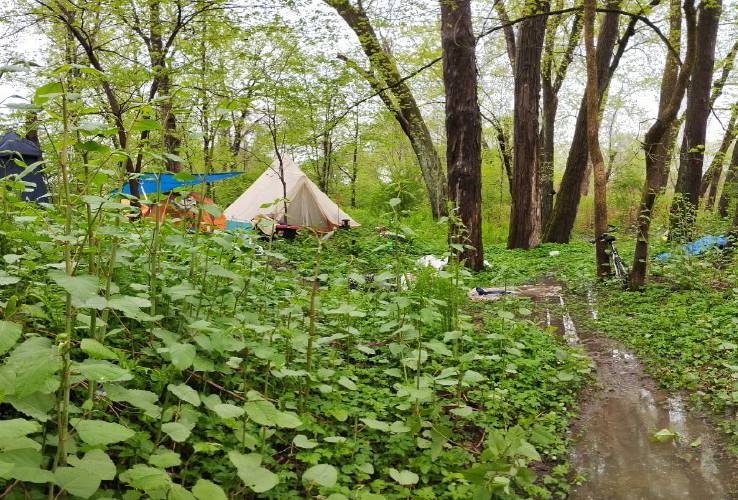Amid flooding, Greenfield committee seeks safer encampment areas for homeless

A homeless encampment at Green River Park faces consistent flooding. CONTRIBUTED PHOTO
| Published: 05-08-2025 3:44 PM |
GREENFIELD — After rainstorms brought flooding to the region last weekend that impacted the city’s homeless population, members of the newly formed Unhoused Community Committee discussed forming designated camping areas for the homeless.
Member Pamela Goodwin pitched the idea of finding a city-owned encampment area for the homeless while more permanent solutions are drafted in city government.
“I would like to find out if there’s town property, that’s not a flood zone, that people can be relocated to,” Goodwin said. “There’s got to be areas where these people, who deserve housing and who are suffering now because of the weather, can be relocated without trespassing. If it can’t be town property, then who in the community would be willing to allow these people to stay dry?”
During the ad-hoc committee’s inaugural meeting Thursday morning, member Christie Allen, who is homeless, shared photos of her flooded campsite at Green River Park. She explained she expects the problem will continue, with the area being under flood watch on Friday.
Allen added that with ice and snowmelt earlier this year, those who sleep at Green River Park had to walk through cold, wet conditions only to find their tents and personal belongings ruined.
“The flood was bad,” Allen said. “From the beginning of the site all the way in, it got flooded from the ice and snowmelt. We had no way of getting into the woods to get to our site. … It is a very dangerous situation and something we need to address right now.”
Member Larry Thomas explained that while Green River Park’s secluded location and lack of police intervention makes it a popular encampment site, he has seen countless tents get washed away during flooding events. He noted that the city’s homeless population needs a more stable place to camp.
Thomas added that he receives donations of tents, sleeping bags, shoes and other supplies from the Interfaith Council of Franklin County and the Opioid Task Force of Franklin County and the North Quabbin Region for distribution to the homeless.
Article continues after...
Yesterday's Most Read Articles
 A comforting craft: Greenfield knitting circle donates to hospital, police and school
A comforting craft: Greenfield knitting circle donates to hospital, police and school
 The hot new spot in Shelburne Falls: Hotfire Bar and Grill feels in many ways like a home kitchen
The hot new spot in Shelburne Falls: Hotfire Bar and Grill feels in many ways like a home kitchen
 New Whately highway superintendent settles in
New Whately highway superintendent settles in
 Amid dwindling membership, Northfield Kiwanis Club to dissolve
Amid dwindling membership, Northfield Kiwanis Club to dissolve
 Grants to illuminate Massachusetts history for Revolution’s 250th anniversary
Grants to illuminate Massachusetts history for Revolution’s 250th anniversary
 MassDEP to handle First St. cleanup in Turners Falls; site slated for affordable housing
MassDEP to handle First St. cleanup in Turners Falls; site slated for affordable housing
In response to Goodwin’s suggestion that the city sanction an encampment area, Chair Sara Brown, who serves as an at-large city councilor, presented a map of city-owned properties that could potentially serve as relocation spots.
“This is a starting map that we can use,” Brown said. “We could meet with the mayor or the police chief. … I agree that this is a high priority to identify somewhere else.”
Police Officer Zoe Smith, who serves as a committee member, said that while Police Chief Todd Dodge has the authority to deprioritize enforcement of an area, he would likely not be able to help the city designate a sanctioned encampment site.
“I think this is a no-brainer. It wouldn’t be up to me to set those priorities, but seeing as how we’ve already acknowledged our intention and willingness to do that, extending that to an area that is more appropriate is a no-brainer,” Smith said. “I will speak to the chief about … enforcement priorities. Choosing the site is not something for the chief to hand us a list of locations back that he’s OK with.”
Brown noted that while an unenforced encampment area would serve as a temporary means to keep people safe, the city should consider long-lasting housing for the homeless in the future, similar to the transitional housing village communities of Austin, Texas, and Portland, Oregon.
“There’s a range of sanctioned encampment, to decriminalized and not enforced [camping],” Brown said. “It’s a question of, ‘How do we have more affordable housing, more transitional housing and how do we have a safe place to camp?’ We need all of them.”
Anthony Cammalleri can be reached at acammalleri@recorder.com or 413-930-4429.






 New community development administrator takes reins in Whately
New community development administrator takes reins in Whately Rubik’s champ: Ashfield resident Levi Gibson among the world’s fastest speedcubers
Rubik’s champ: Ashfield resident Levi Gibson among the world’s fastest speedcubers PHOTOS: Musical medley in Shelburne Falls
PHOTOS: Musical medley in Shelburne Falls
